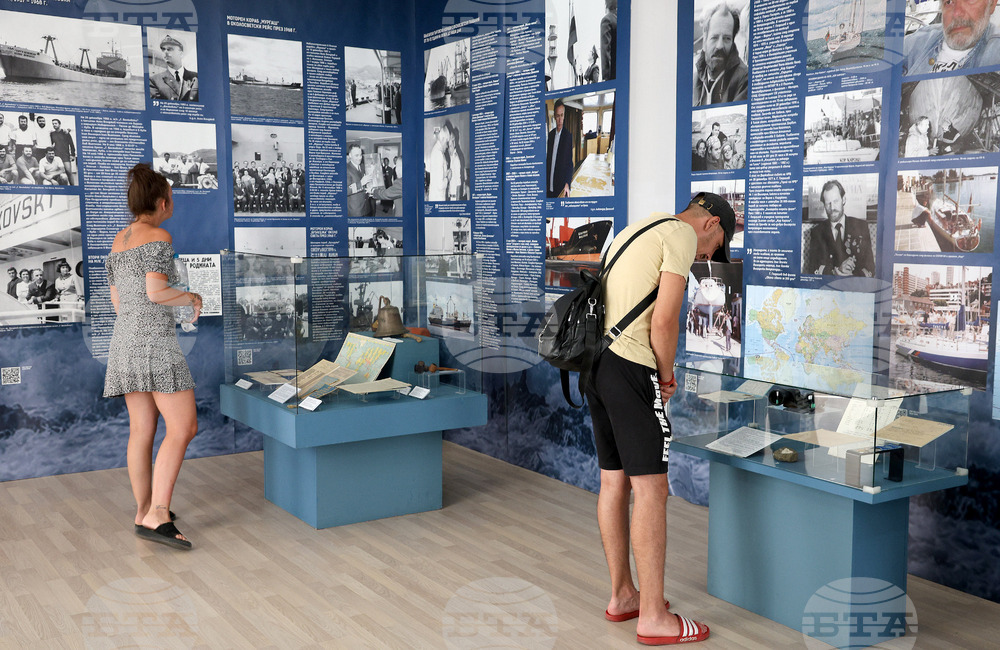site.btaExhibition in Varna Traces Bulgaria's Round-the-World Voyages


An exhibition titled Bulgaria’s Round-the-World Voyages opened at the Maritime Museum in Varna on Friday. The event coincides with Sea Week and comes just ahead of Bulgarian Navy Day, celebrated on August 10, the museum’s director, Mariana Krasteva, said.
Speaking to the Bulgarian News Agency, Krasteva noted this is the first exhibition dedicated to all of Bulgaria’s voyages around the world. Organized chronologically, it begins with the G. S. Rakovski motor vessel- the first Bulgarian vessel to circumnavigate the globe in 1964 - and concludes with the Milin Kamak bulk carrier, which returned from its journey in May 2025.
“What we are presenting is an answer to the question: is Bulgaria a maritime nation? In 60 years, we have documented 18 merchant ship voyages and eight yacht circumnavigations, with two more currently in preparation,” Krasteva noted. She stressed that Bulgaria has earned its place among the world’s maritime nations. In her words, sailing from the Black Sea has its peculiarities, as it requires passing through the Bosphorus and the Dardanelles, which she described as “a navigational obstacle and a geographical barrier.”
The most difficult sailing routes are those that pose a challenge in terms of the conditions that nature offers, Krasteva said, adding that chief among them is the passage south of Cape Horn. The first Bulgarian to navigate this route was Captain Nikolay Dzhambazov, aboard his self-built yacht Tangra.
Krasteva believes that Bulgarian circumnavigators receive the necessary support and attention in their community. The first Bulgarian solo voyage – that of Captain Georgi Georgiev - was state-backed, which is understandable considering that personal initiatives were tightly regulated in the 1970s, she said. Georgiev was selected by the yacht club to compete in the OSTAR '76 regatta and later embark on a round-the-world journey. He was awarded numerous state honors and was recognized in the Guinness Book of Records (1981–1982) for the fastest solo circumnavigation of the world in a monohull vessel, completing his voyage aboard Cor Carolli in 201.9 days (201 days, 21 hours, and 36 minutes).
Round-the-world sailing became more common after the fall of communism in 1989, as travel restrictions eased and yacht-building became more accessible, the museum’s director said. Interest in yachting surged, especially following Georgiev’s voyage. In Krasteva’s words, there have been no known fatalities or serious accidents among Bulgarian circumnavigators.
The most recent sailor featured in the exhibition is Pavlin Nadvorni, who entered the 2023–2024 Global Solo Challenge aboard his yacht Espresso Martini. He had to end his voyage for health reasons, Krasteva said and praised him as a well-prepared and dedicated modern sailor.
“Over the past 60 years, technology has changed and ambitions have evolved, but the sea remains as unforgiving as ever,” Krasteva noted, adding that sailors are a special breed of people.
The exhibition features a variety of artifacts such as Captain Georgi Georgiev’s binoculars, items from the Tangra yacht, Vasil Kurtev’s award for best Bulgarian maritime achievement with Odessos, Doncho Papazov’s logbook from Tivia, and documents issued by port authorities around the world during the voyage of Magnolia, skippered by Vasil Popov.
Visitors can also view excerpts from two documentaries: Around the World in 202 Days, about Captain Georgiev, and The Sailor Who Made His Dream Come True, about Vasil Kurtev. Footage from Nadvorni’s recent voyage is also featured. QR codes are also available.
The exhibition’s opening was attended by several of the sailors, as well as the Commander of the Bulgarian Navy, Rear Admiral Kiril Mihaylov. He praised the yachtsmen, noting that what they achieve inspires admiration and awe. Mihaylov said that Bulgaria still behaves more like a coastal country than a maritime one because its leaders, and even the public, are more focused on the sandy beaches and the shore than on the sea itself.
/VE/
Additional
news.modal.image.header
news.modal.image.text
news.modal.download.header
news.modal.download.text
news.modal.header
news.modal.text






